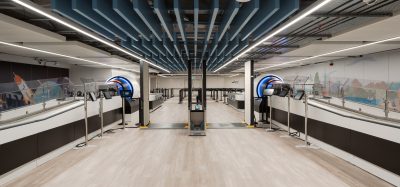How mouse neurons may bring an end to airport security as we know it
- Like
- Digg
- Del
- Tumblr
- VKontakte
- Buffer
- Love This
- Odnoklassniki
- Meneame
- Blogger
- Amazon
- Yahoo Mail
- Gmail
- AOL
- Newsvine
- HackerNews
- Evernote
- MySpace
- Mail.ru
- Viadeo
- Line
- Comments
- Yummly
- SMS
- Viber
- Telegram
- Subscribe
- Skype
- Facebook Messenger
- Kakao
- LiveJournal
- Yammer
- Edgar
- Fintel
- Mix
- Instapaper
- Copy Link
Posted: 29 August 2017 | International Airport Review | 1 comment
A Silicon Valley-based scientist has unveiled a prototype for a device that stands to revolutionise how we fly.


NEUROTRAVEL: Mr Agabi's research may mean a smoother flying experience
Speaking at TED Global in Tanzania, Oshiorenoya Agabi revealed to the assembly his Koniku Kore – a computer with a spectacular twist.
The device is based not on silicon but on living tissue, namely the neurons of mice.
Biology is technology.
It has been trained to sniff out the scent of explosives and as such could sound a death knell to present-day airport security.
With the Nigerian’s technology squirrelled away in the walls, fliers might simply breeze from check-in to boarding unimpeded.
Quoted by the BBC, Mr Agabi said of the Koniku Kore: “Biology is technology. Bio is tech. Our deep learning networks are all copying the brain.
“You can give the neurons instructions about what to do – in our case we tell it to provide a receptor that can detect explosives.
“We think that the processing power that is going to run the robots of the future will be synthetic biology-based and we are laying the foundations for that today.”
The Koniku Kore is a blend of living tissue and silicon with ‘olfactory capabilities’ and represents something of a leap forward in the realm of neuroscience.
Whereas previously researchers have struggled to keep neurons alive in a small cluster, with the Koniku Kore, Mr Agabi’s team have done something unprecedented.
“This device can live on a desk and we can keep them alive for a couple of months,” he added.
Not limited to smoothing out the airport experience, the Koniku Kore has medical applications.
Embedded in the walls of a hospital, the sensors might detect markers of disease in the air molecules a patient expels long before it becomes terminal.
A tipping point
Prof John Donoghue, head of the Wyss Center for bio and neuro-engineering in Geneva, has been researching technology to allow people with paralysis to move limbs using their brain waves.
He told the BBC the field is at a “tipping point” where biological and digital systems will merge.
The idea being pursued by Mr Agabi is interesting, he said: “Digital computers are fast and reliable but dumb, whereas neurons are slow but smart.
“But they are not so good in a little dish and the big problem will be keeping them alive and happy. That is going to be a big challenge.
“Will we have a dish of neurons computing on our desk? I don’t know.”
Related topics
New technologies, Safety, Security, Sensory technology, Terrorist attacks



















Respectfully, I think this could be easy to foil. All a terrorist needs is their own sensor and they can tailor their ‘package’ until it passes the sensor. Then they deliver the undetectable package.
I would guess that airline security is far from obsolete.